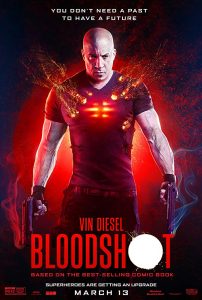Sufficiently Advanced Tech Bros Are Indistinguishable from Dark Magicians: Josh Pearce and Arley Sorg Discuss Bloodshot
 Based on the Valiant comic book series of the same name, Bloodshot is about a US Marine, Ray Garrison (Vin Diesel), who is brought back from the dead through the application of nanotechnology, which endows him with superhuman abilities.
Based on the Valiant comic book series of the same name, Bloodshot is about a US Marine, Ray Garrison (Vin Diesel), who is brought back from the dead through the application of nanotechnology, which endows him with superhuman abilities.
The film initially follows all the standard sci-fi action fare as Garrison pieces together what has happened to him, and what he can do now, and it’s exactly as terrible as you would expect from a cliché-ridden Vin Diesel action movie. But then, through interactions with the doctor who brought him back to life (Guy Pearce) and a team of other reconstructed soldiers, Garrison learns that there’s more going on than he’s been told, the movie undergoes a paradigm shift, and it is awesome.
Arley: You pretty much called it: the first 30 minutes suck. But stick with it, and that’s not something I would usually say about a movie. Even the clichés and the plotholes end up making sense!
Josh: I wonder if they made the beginning that bad on purpose.
Arley: I think they must have — there were so many problems stacked up. Look at how good the rest of the movie is and you know they didn’t use all those clichés accidentally.
Josh: When I was first watching it, I thought to myself, “There’s no way I can recommend this, but maybe there will be some good visual action we can praise it for.” But then it completely blindsided me. I’m not going to spoil anything that isn’t in the trailer, because I want other people who watch it to have the same experience. Actually, the trailer gives too much away. If you haven’t seen the movie yet, don’t watch the trailer.
Arley: Nobody’s seen this movie yet. Everything’s on lockdown.
Not to say that the rest of the movie is flawless; it still takes shortcuts and relies heavily on Vin Diesel’s limited emotive range. The rest of the cast deliver characters who, though they are thinly sketched and slot into the plot like Tetris blocks, are engaging enough to lift the movie up above its other shortcomings.
Arley: I think they telegraphed pretty well some things that they needed to for other things to fall in place. As soon as the doctor showed up with his mechanical arm, you know what role he’s going to play later on. Soon as I saw Eyes and Legs, I knew Vin Diesel would end up fighting them.
Josh: I liked the character design of those other soldiers: Dalton (Sam Heughan) with his metal limbs, and Tibbs (Alex Hernandez) with his sniper helmet and drones, looked amazing. But I thought KT (Eiza González) was a little out of place, because her prosthesis didn’t necessarily make her a better fighter. If she had needed to swim underwater or fight underwater, it would make more sense.
Arley: It was overly specific. Would’ve been cool if she had gas grenades hanging off a harness all the time so she could hit people with a fog of war or knockout gas whenever she got into a fight. I’m glad she was ultimately a badass, though, and didn’t need to be saved.
Josh: Glad they didn’t make it a romance between her and Garrison, either.
Arley: They walk right up to the line but leave it a bit ambiguous. Wilford Wigans (Lamorne Morris) is the best. Really funny, nice comic timing, gives needed breaks in the tension. He pulls off the perfect self-deprecating egotist nerd.
Josh: He has a little bit of imposter syndrome even though he is actually the best. I really like the other tech guy, too — Eric (Siddharth Dhananjay) — and their little hacker battle was believable. Comparatively, the only time I thought Vin Diesel was convincing was when his wife was about to be killed and he was saying he couldn’t tell what they wanted because he just doesn’t know. The desperate look on his face in that scene was terrifying.
Arley: Vin Diesel is actually a nerd, so I go into things like this with a bit of faith. He’s a gamer and a comic book guy. Most of his best movies have a comic book feel. That said, he generally plays “big badass” and that’s what he does well. I buy into him being a big badass of whatever flavor. Downside, his movies lean toward lowkey sexist. They are “dude flicks” and “dudes” are the obvious target audience. Don’t know if it’s the industry, the genre, or him.
Josh: There was also an interesting part in Bloodshot between Garrison and Wigans that goes something like this:
Garrison: “I saw my wife in a dream.”
Wigans: “That’s good.”
Garrison: “She was being murdered right in front of me.”
Which is just like Memento:
Carrie-Anne Moss: “What’s the last thing you remember?”
Guy Pearce: “My wife.”
Carrie-Anne Moss: “That’s nice.”
Guy Pearce: “Dying. I remember my wife dying.”
And you have to think that’s an intentional echo, especially with Guy Pearce appearing in both.
Rounding out the cast is Talulah Riley, who is Elon Musk’s on-again, off-again wife.
Nanotechnology in film inevitably gets everything wrong, some more than others. We discussed this at length in our review of Terminator: Dark Fate. Bloodshot makes its own mistakes, but the visual effect of seeing Garrison’s nanomachine swarm in action is one of the film’s highlights and, unlike other depictions, his powers actually have specified limits.
Arley: He was overpowered, but not invincible. They talked about overclocking the nanites and needing to recharge them, and he could be taken down by magnets or EMP. I liked the look of the nanites, when they showed them in his blood.
Josh: Oh, that was a moment that really took me right out of it, from a technical standpoint. A robot on a nanometer scale is not going to have claws and legs and a big glowing red eye. There’s no room for those kinds of components. They’d be simple geometric shapes like buckyballs, because they’re built out of basic atoms and molecules. But that’s okay, for this movie, I guess. Because what are the three magic words in science fiction?
Arley: Quantum, nano, and AI. If you use any of those terms in your film, you might as well just be saying “magic.”
Josh: It all falls under the umbrella of Arthur C. Clarke’s dictum: “Sufficiently advanced blah blah blah is indistinguishable from yadda yadda yadda.” Just like we were saying about The Invisible Man, where the technology made him indistinguishable from a ghost. And just like the quantum in Ant-Man or Dr. Strange.
In concept, story beats, technology, and visual design, there are a lot of elements of Robocop and The Six-Million Dollar Man, plus Spider-Man, The Matrix, Terminator, Upgrade, Transcendence, Universal Soldier, Deadpool, The Truman Show, The Game, The Punisher, and the Deus Ex video games (especially the original). So, nothing we haven’t seen before in science fiction, but combined in such a way to make a fresh treatment of the material. Again, caveat, disregarding the opening set-up.
Arley: So many references in this movie, which all work together somehow. Compared to the Ready Player One movie, which references a lot of stuff and is a piece of shit. Sidenote — the twists after the paradigm shift felt like a heist movie. Can’t quite put my finger on it. I think it’s the, “We actually did something an hour ago and didn’t tell you about it,” narrative technique, which is what they do in a lot of heist movies.
The double aspect of the film, how it’s divided into a really low-quality opening followed by an inventive second act, reflects the mixed experience and credits of the two screenwriters. Jeff Wadlow is responsible for the sub-par Kick-Ass 2 as well as the Blumhouse flops Truth or Dare and Fantasy Island. Eric Heisserer, on the other hand, received an Oscar nomination for his Arrival screenplay.
This is director Dave Wilson’s first full-length film, though he also did the pilot episode, “Sonnie’s Edge”, from the Love, Death & Robots animated Netflix series, which is one of the strongest episodes of that show. He also has multiple credits as a visual effects artist and director for video games, which probably explains why the camerawork is so painful.
Arley: I think the people behind the scenes have a background in tech. When they were building the landscape in the computer simulation, my friend Di was saying he actually uses similar software at his architecture firm.
Josh: Yeah it looked like they just put up a pre-render of their special effects program or something. There were some interesting visual choices in this film, and for the most part, the CGI looked okay.
Arley: Some sequences were better than others, but it was overall good enough.
Josh: I found the CGI sections to be the easiest parts of the movie to watch because the shaky cam/choppy edits weren’t in it, because you’d have to specifically program those in to a CGI scene. I actually really liked the ending fight scene. How the nanos looked, and how he used them! And then the very last line (of both the fight and of the movie) totally sold it for me.
Arley: I agree with you, but that fight shouldn’t have happened. It didn’t make sense with the set up of the story. KT should have killed him, which would have been more original; or he should have had a helicopter, or there would have been hella armed guards for Vin Diesel to cut through.
Josh: Small gripes. If you can get past the really rocky start, you can get past anything else in the rest of the film.
Bloodshot doesn’t feel like the standard comic book content being thrown up on screen recently. Garrison is not a superhero, he doesn’t wear a costume or have a secret identity. Coming from Valiant, a smaller comic publisher than Marvel or DC, gives the film a feeling of operating outside the corporate confines that restrict the creativity of big-banner comic book films. At most, Bloodshot feels like a throwback to the Vertigo imprint with its touch of body horror and the slightly rough-around-the-edges feel to its production value.
Arley: More philosophically, there’s a throughline about free will, brought home in the last conversation. Even in the very first scene, he disobeys orders to breach the building. You think he’s a maverick asshole, but later all your ideas about what’s happening in that scene have to be re-thought. With KT, she can’t do what she wants because she’s being suffocated. She finds a way around it and says, “You think I’d let you do that again?” Later, Vin Diesel goes off plan and KT says, “What is he doing?” and Wigans says, “Whatever he wants to I guess,” and she says, “Finally.”
Unfortunately, this film was also released at the worst possible time during a plague season, virtually guaranteeing financial failure. Hopefully other independent comics studios won’t be discouraged, and perhaps Bloodshot will find a second life on streaming and rental services.
Arley: It’s worth seeing. Really, the less you know going in, the better.
Josh: I would totally recommend this movie, but I’m having a hard time thinking of any women I know who I would recommend it to.
Arley: Fair point. Cosigned.
Josh: Only if you’re really into science fiction are you going to get past the Vin Diesel, dude-bro, military shoot-’em-up machismo that saturates it. There’s a dick joke that has more of an arc than one of the female characters does. It keeps coming up, and the joke itself isn’t all that funny, but they keep working it in wherever they can.
Directed by: Dave Wilson
Written by: Jeff Wadlow & Eric Heisserer
Based on the comic book by: Kevin VanHook, Bob Layton & Don Perlin
Starring: Vin Diesel, Eiza González, Sam Heughan, Toby Kebbell, Talulah Riley, Lamorne Morris, Guy Pearce, Siddharth Dhananjay & Alex Hernandez

ARLEY SORG, Associate Editor, grew up in England, Hawaii, and Colorado. He studied Asian Religions at Pitzer College. He lives in Oakland, and usually writes in local coffee shops. A 2014 Odyssey Writing Workshop graduate, he is soldering together a novel, has thrown a few short stories into orbit, and hopes to launch more.
JOSH PEARCE, Assistant Editor, started working at Locus in 2016. He studied creative writing at SFSU and has sold short stories and poems to a variety of speculative fiction magazines. Born and raised in the Bay Area, he currently lives in the East Bay with his wife and son and spends way too much time on Twitter: @fictionaljosh. One time, Ken Jennings signed his chest.
 While you are here, please take a moment to support Locus with a one-time or recurring donation. We rely on reader donations to keep the magazine and site going, and would like to keep the site paywall free, but WE NEED YOUR FINANCIAL SUPPORT to continue quality coverage of the science fiction and fantasy field.
While you are here, please take a moment to support Locus with a one-time or recurring donation. We rely on reader donations to keep the magazine and site going, and would like to keep the site paywall free, but WE NEED YOUR FINANCIAL SUPPORT to continue quality coverage of the science fiction and fantasy field.
©Locus Magazine. Copyrighted material may not be republished without permission of LSFF.








